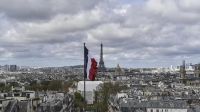On a sunny spring day, it would seem that nothing could disturb the peace of the sleepy German village of Tröglitz, as the residents quietly go about their business or take walks in the blossom-scented air.
But the charred roof beams of a newly renovated apartment building in the middle of the village tell a different story. Early on Easter Saturday, villagers were woken by fire engines and saw flames leaping into the night.
Police suspect arson because the building is a designated hostel for asylum seekers. “People are crying,” says Markus Nierth, the former mayor. “They are in such shock they can’t speak.”
What has shocked Tröglitz, has shocked Germany. The blaze is a painful reminder of the fact that, as the country absorbs waves of refugees and economic migrants, the government’s liberal approach faces resistance — and even extremist responses.
Assaults on refugees or on their accommodation are rising rapidly, says Pro-Asyl, an asylum lobby group that recorded 47 cases in the first quarter of this year. That puts Germany on course for about 200 cases this year, compared with about 150 in 2014, 50 in 2013 and 24 in 2012.
These numbers are tiny in comparison with asylum-seeker inflows, which last year rose nearly 60 per cent to 175,000, the highest number in the industrialised world. They are also insignificant set against Germany’s success in absorbing immigrants over past decades, during which its foreign-origin population has grown to almost 20 per cent.
But the assaults raise fears of an upsurge in anti-refugee prejudice of the kind that accompanied the last big immigration wave into Germany after the collapse of communism in eastern Europe in the early 1990s.
‘People are crying. They are in such shock they can’t speak‘
- Markus Nierth, former mayor of Tröglitz
Tweet this quote
Manfred Güllner, head of the Forsa Institute polling agency in Berlin, says: “Tröglitz is an exceptional case. But there must be a danger that there will be more cases.”
The fire follows the re-emergence of peaceful anti-immigration protests, notably by Dresden-based Pegida.
While Angela Merkel, the chancellor, has condemned Pegida, some other conservative leaders have spoken of taking the protesters’ complaints into account.
Mr Güllner says this ambivalence has helped to make migration’s critics “respectable”.
In Tröglitz, a village of 2,300 in the former communist East Germany, the arguments first surfaced at the turn of the year, when the local regional council announced plans to place around 40 refugees.
Villagers opposed to the proposal quickly sought organisational aid from the regional branch of the neo-nazi NPD, which helped stage regular Sunday marches. The marchers avoided extremist slogans, protesting not at “genuine refugees” but at “economic migrants”. But the unspoken message was clear: no asylum seekers in Tröglitz.
Mr Nierth, a 46-year-old bereavement counsellor who was then still mayor, campaigned for welcoming the refugees. The regional council says the accommodation plan won broad support, as measured by applause at a key public meeting of about 500 people in the village, 20 miles from Leipzig in Saxony-Anhalt.
‘We are normal people’
But the anti-immigration marches continued. While they drew only 100 or so demonstrators, the neo-nazi involvement worried Mr Nierth, who has seven children. To his horror, the marchers prepared plans last month to change their normal route – and instead pass in front of his home.
He asked the regional council, which controls demonstrations, to have the march rerouted. When officials failed to deliver a decision in time, he resigned.
His departure made national news, cast as a victory for the far-right over democracy. Even though Tröglitz is a small place, many Germans are sensitive on this score because of the country’s nazi past. And the broad population has had to stomach an NPD triumph, albeit that many mainstream politicians have renewed calls for the party to be banned.
The subsequent arson attack has magnified concerns. The NPD has denied any involvement, saying the crime had hurt its position in Tröglitz because nobody would now join any march that might be associated – however mistakenly – with supporting arson.
Meanwhile, the regional council is sticking to its plan to bring asylum seekers to Tröglitz. “We must find a solution,” says Götz Ulrich, the Burgenland district council chairman, who is under police protection. He is looking to place about 10 people by early June in individual flats, as it could be months before the original accommodation is repaired.
According to Germany’s national asylum-seeker policy, the region is due to take 750-1,000 such refugees this year. With a local population of 182,000, that is “perfectly achievable”, says Mr Ulrich.
Tröglitz has some specific difficulties, especially poverty and high unemployment following the closure in the early 1990s of the only big employer, a large chemical works. Outside its medieval core, Tröglitz is composed largely of low-rise blocks of flats. The villagers, says Mr Nierth, have “little civic sense”.
Hostility towards immigrants is also fairly common elsewhere in eastern Germany, where contacts with foreigners were rare before 1990. And it is present in some conservative western regions, notably Bavaria.
But Bernd Mesovic of Pro-Asyl, argues that while people are rightly concerned about the upsurge in violence, they should also give credit to those welcoming migrants. He says: “In my 30 years of experience, I have never seen so much support.”
Source: The Financial Times
![]()









